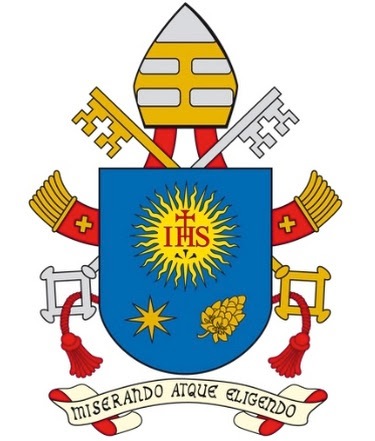Chaos Frank restructures the Roman Curia…
Antipope Francis
“Apostolic Constitution” Praedicate Evangelium
on the Roman Curia
and its Service to the Church and the World
March 19, 2022
This past Saturday, Mar. 19, 2022, Francis finally promulgated his long-awaited document overhauling and restructuring the Roman Curia, which is traditionally “the ensemble of departments or ministries which assist the sovereign pontiff in the government of the Universal Church” (Catholic Encyclopedia).
The document is an “Apostolic Constitution” and bears the title Praedicate Evangelium (“Preach the Gospel”). It is the fruit of about nine years of work by Francis and his “Council of Cardinal Advisors” that was instituted in 2013 for this very purpose. Among the collaborators are “Cardinals” Reinhard Marx, Pietro Parolin, Oscar Rodriguez Maradiaga, and Sean O’Malley.
The last such “papal” document reforming the Roman Curia was Pastor Bonus of “Pope Saint” John Paul II, released in 1988. It has now been replaced by Praedicate Evangelium, which will take effect on June 5, 2022, Pentecost Sunday.
Interestingly enough, the Vatican has not yet released the text of the new constitution in English. In fact, only the Italian original of Praedicate Evangelium has been released so far — much to the surprise of journalists, who had been told that one of the reasons why it was taking the Vatican so long to publish the document was that it was still being translated:
- Full Text of Praedicate Evangelium in Italian
- Vatican Press Office Communiqué of Mar. 19, 2022 (English)
[UPDATE 29-JUN-2022: Vatican releases official English translation:]
On Monday, Mar. 21, the Vatican held a press conference introducing the new constitution (Italian):
A brief English-language video summary has been released by Rome Reports:
Vatican News has released the following official information in English:
- “Pope Francis promulgates Apostolic Constitution on Roman Curia ‘Praedicate Evangelium'” (Vatican News)
- “‘Praedicate Evangelium’ presented at Holy See Press Office” (Vatican News)
- “Baptism and mission: Two conciliar keys to Praedicate evangelium” (Vatican News)
One of the most radical changes presented in Praedicate Evangelium is that the laity, male or female, are now permitted to head the curial departments:
A key change is the elevation of the role of the laity in the governance of the Vatican Curia, and by extension, in the wider Church. “The Pope, the Bishops and other ordained ministers are not the only evangelizers in the Church,” reads the text. Therefore, the laity — male or female — must have “roles of government and responsibility,” orders Pope Francis.
Praedicate evangelium thus decrees that “any member of the faithful can preside over a Dicastery or an Organism, given the particular competence, power of governance and function of the latter.”
Such lay leaders for the Curia will be chosen insofar as they are “distinguished by spiritual life, good pastoral experience, sobriety of life and love for the poor, spirit of communion and service, competence in the matters entrusted to them, ability to discern the signs of the times.”
(Michael Haynes, “Pope Francis reforms Roman Curia, says any layperson can hold ‘governance’ positions in Vatican”, Life Site, Mar. 19, 2022)
The “lodestar” driving this new curial overhaul is alleged to be that of evangelization. We all know how much the Vatican II Church has to do with genuine evangelization, the conversion of non-Catholics, and the salvation of souls, so this is just the usual window dressing.
The English-language Wikipedia entry on Praedicate Evangelium notes: “The Curia includes sixteen dicasteries. Curial departments that were previously called congregations or pontifical councils, are now named ‘dicasteries’, e.g. the Congregation for the Doctrine of the Faith will be known as the ‘Dicastery for the Doctrine of the Faith’.”
It goes on to list the 16 curial dicasteries as follows:
- Dicastery for Evangelization
- Dicastery for the Doctrine of the Faith
- Dicastery for the Service of Charity
- Dicastery for the Eastern Churches
- Dicastery for Divine Worship and the Discipline of the Sacraments
- Dicastery for the Causes of Saints
- Dicastery for Bishops
- Dicastery for the Clergy
- Dicastery for Institutes of Consecrated Life and Societies of Apostolic Life
- Dicastery for the Laity, Family and Life
- Dicastery for Promoting Christian Unity
- Dicastery for Interreligious Dialogue
- Dicastery for Culture and Education
- Dicastery for Promoting Integral Human Development
- Dicastery for Legislative Texts
- Dicastery for Communication
The following reports share more information about the background to and contents of Praedicare Evangelium:
- “Pope Francis launches Vatican restructure aimed at flexibility and collaboration” (The Pillar)
- “How Praedicate evangelium changes the Vatican’s dicasteries: A CNA Explainer” (Catholic News Agency)
- “Vatican explains new reform of Roman Curia, with evangelization at its core” (Crux)
- “Praedicate evangelium: Pope Francis’ curial reform still a work in progress” (The Pillar)
- “Pope Francis is drawing on Vatican II to radically change how the Catholic Church is governed” (America)
- “Roman Curia reformed: Pope Francis’ revolution” (La Croix International)
- “Praedicate evangelium: Things you might have missed in the new Vatican constitution” (Catholic World Report)
- “How Pope Francis is redefining the role of the Roman Curia” (La Croix International)
- “Pope Francis reforms Roman Curia, says any layperson can hold ‘governance’ positions in Vatican” (Life Site)
- “Praedicate evangelium: Pope Francis reforms Roman Curia with launch of Vatican constitution” (Catholic World Report)
- “Pope writes his vision for the Church into new constitution for Roman Curia” (Crux)
- “10 Highlights of ‘Praedicate Evangelium’” (National Catholic Register)
For more information about the man who falsely claims to be the Pope of the Catholic Church (“Pope Francis”), please see our topical page here.
Image source: Wikimedia Commons
License: CC BY-SA 3.0



No Comments
Be the first to start a conversation